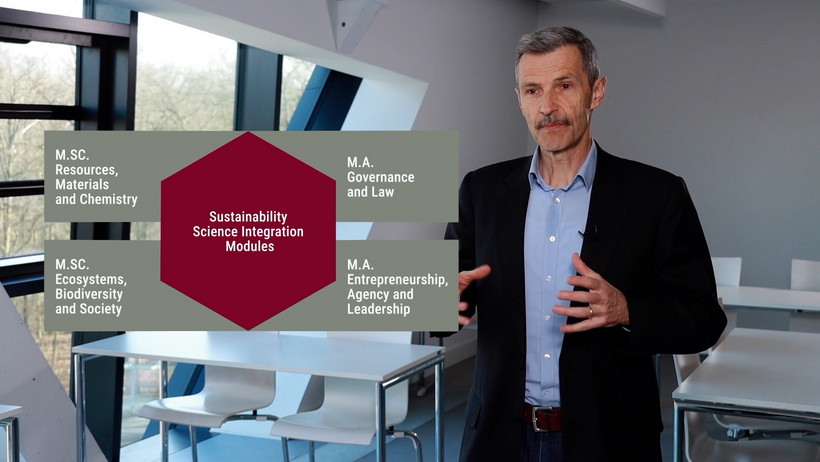Sustainability Science: Ecosystems, Biodiversity and Society (M. Sc.)
Masters Programme
Understanding the link between biodiversity and ecosystem functioning is central for human well-being. Human activities shape ecosystems, and ecosystems, in turn, generate the conditions that enable human societies to thrive.
This Master's programme is unique in that it recognises that effective ecosystem management hinges on in-depth understanding of ecosystem processes and how they are interlinked with social-ecological system dynamics. This also includes the challenges of the ongoing climate and biodiversity crises.
The Master's programme follows an interdisciplinary approach that covers concepts of fundamental and applied ecology just as much as concepts from the social sciences (e.g. governance or participation).
Students studying this Master's programme will be equipped to deeply understand, navigate and influence ecological processes and social-ecological interactions. Emphasis is placed both on fundamental ecological knowledge as well as on positive social-ecological interactions such as the building of resilience and the restoration of ecosystems.
At a Glance
- Degree awarded: Master of Science (M.Sc.)
- Application deadline: EU degrees: 1 June / Non-EU degrees: 1 May
- Highlights: Exploring the interactions of ecosystems and society, tackeling real-world problems of social-ecological systems in transdisciplinary approaches, interdisciplinary peer-learning in an international context
- Ist aimed at: Ecology enthusiasts with a passion for sustainability and system dynamics
- Type of programme: Thematic relevance
- Study places: 25
- Start date: October 1
- Extent: 120 CP according to ECTS
- Duration: 4 semesters
- Language: English
- Semester contribution: approx. 450 EUR
Ecosystems, Biodiversity and Society – The Programme
Content
Sustainability is a central goal for humanity in the 21st century. Understanding ecological processes and navigating social-ecological interactions, in turn, is central to sustainability. The careless exploitation of natural resources has had deleterious consequences for ecosystems and biodiversity around the world.
But not all human activities are necessarily harmful for ecosystems: grounded in a deep understanding of social-ecological interactions, human societies can re-build and restore resilient ecosystems.
This programme covers ecological themes such as changes in biodiversity and ecosystem functioning in the Anthropocene, as well as how these changes are shaped by and influence through feedbacks the social fabric of human communities. Social and ecological phenomena are therefore understood to be intimately connected.
The appropriate governance of social-ecological complexity, in turn, can be informed by social-ecological systems thinking – including key ecological and social-ecological concepts such as ecosystem functioning, ecosystem services (or “Nature’s Contributions to People”), resilience, thresholds or tipping points, regime shifts, and participatory scenario planning. Throughout the programme, both quantitative and qualitative methods are used to better understand the complex dynamics of social-ecological systems.
In addition to building an understanding of ecosystems, societies, and the interlinkages between the two, the programme offers engagement with the idea and practice of transdisciplinarity. In so-called transdisciplinary projects, students will engage with real-world problems and the actors empowered to make real-world decisions.
Structure
The Master's programme is organised in three parts: Introductions, Deep Dive and Elective Focus.
Introductions into organisational transformation management and entrepreneurship, individual change agency and psychology, sustainability science and transdisciplinary research design lay the foundations of this programme. Here you gain an overview of psychological and management theories and approaches to systematically analyse key sustainability challenges and to distinguish individual and organisational approaches of sustainability transformation at the individual and organisational level.
The Deep Dive phase analyses practices of sustainable entrepreneurship, (un)sustainable consumption, approaches of market-oriented sustainability management and market transformations and Sustainability Psychology with the aim of establishing new social businesses and transforming established companies. You will reflect on theories and empirical studies about perceptions, decision-making and behaviour related to sustainability transformations on the individual, group and organisational level. In a practice-oriented transdisciplinary project together with students of other Sustainability Science and Psychology Master's programmes the newly acquired knowledge is applied, deepened, and reflected.
The Elective Focus offers a wide range of options to develop an individual specialization focus with sustainability and social science modules of your choice. The programme core is complemented with Leuphana’s complementary studies courses, organised in the three modules ‘Engaging with Knowledge and Sciences’, ‘Reflecting on Research Methods’ and ‘Connecting Science, Responsibility and Society’.
Here you can find further information on the course content of the Master's programme Sustainability Science: Entrepreneurship, Agency and Leadership.
Study Regulations and Subject-Specific Schedule
The following link provides access to documents which set out the general conditions for examinations, an overview of the curriculum, as well as detailed and legally binding regulations.
General Assessment Regulations and the Subject-Specific Schedules
Teaching Personnel
Programme Director
- Prof. Dr. Jörn Fischer
Deputy Programm Director
- Prof. Dr. Vicky Temperton
Teaching Personnel
- Prof. Dr. Jörn Fischer
- Prof. Dr. Vicky Temperton
- Prof. Dr. Berta Martín-López
- Prof. Dr. Andreas Fichtner
- Prof. Dr. Sylvia Haider
- Prof. Dr. David Abson
- Dr. Heike Zimmermann
- Prof. Dr. Markus Quante
- Dr. David Walmsley
- Prof. Dr. Henrik von Wehrden
Studying Abroad
Students of this Master's programme have the opportunity to spend a semester of their studies abroad. For that, we recommend the third semester.
For any questions or to apply, please contact the International Center. The International Center will provide all further information on Erasmus+ funding, and on preparing for and organising your semester abroad.
Career Prospects
Increasingly, as we face the polycrises of biodiversity loss, climate change and upheaval of social systems, the world needs world changers with a solid foundation in critical thinking: people who have both a well-founded training and understanding of the key drivers and interactions in a changing world as well as possible evidence-based paths to more biodiversity and resilience allowing sustainable future.
This Masters spans both state of the art biodiversity-ecosystem functioning research, conservation and restoration ecology and practice as well as allowing a clear understanding of the key role that humans play in affecting biodiversity and nature’s contributions to people. Since many of our current problems in the polycrisis can not be adequately solved without a whole system approach, this Masters will allow students to obtain the necessary in-depth grounding in both more classical ecology, as well as social-ecological and governance themes as well as the ability to link them into a whole systems approach that enable solutions and on the ground practice that is effective.
This Master's programme combining ecology, social ecological systems approaches and governance in relation to the management of systems is unique in the academic landscape at the current time and Leuphana is very well poised to provide it. The uniqueness of this profile should provide students with excellent opportunities in terms of job prospects.
Graduates who would like to continue their academic career are welcome to apply for our doctoral research group on Sustainability Science.
As a student of our Master's programme, you also have the opportunity to start your doctorate at an early stage via the Doctoral Track.
On the Leuphana Career Service website, you will find numerous job offers for student jobs, internships, career entry, or topics for your thesis from companies, research institutions, and non-profit organizations that are specifically aimed at Leuphana students and graduates. In addition, you will find job offers and student jobs within Leuphana University.
Doctoral Track
As a student in our programme, you have the opportunity to start your doctorate early via the Doctoral Track.
Thus, you to become part of the scientific community of our doctoral research groups at an early stage, giving you the unique opportunity to combine your Master's and doctoral studies and, with your doctorate in sight, to obtain your Master's degree en-route.
Admission Requirements and Application
You can find all information about the admission and requirements, the application and the selection procedure on our "Admission and Requirements" page.
International Students
This study programme matches your interests? Then you will find further information for prospective international students on residence and social matters, such as visa, residence permit, health insurance or finding accommodation, on the following pages.
Please note that the information for incoming exchange students and international degree-seeking students differs slightly.
Contact and Counselling
First contact point
The Information Office (Infoportal) is your contact point for
- general information on the application procedure
- initial questions about the study programmes offered at Leuphana
- making an appointment with the Graduate School Student Counselling Service.
Information Office
Building 8, Ground Level
Fon +49.4131.677-2277
studierendenservice@leuphana.de
Campus opening hours
Mon - Thu 9.00 am - 4:00 pm
Fr 9.00 am - 12 noon
Student Counselling
To make an appointment with our Student Counselling Service, please use our booking tool on our website.


